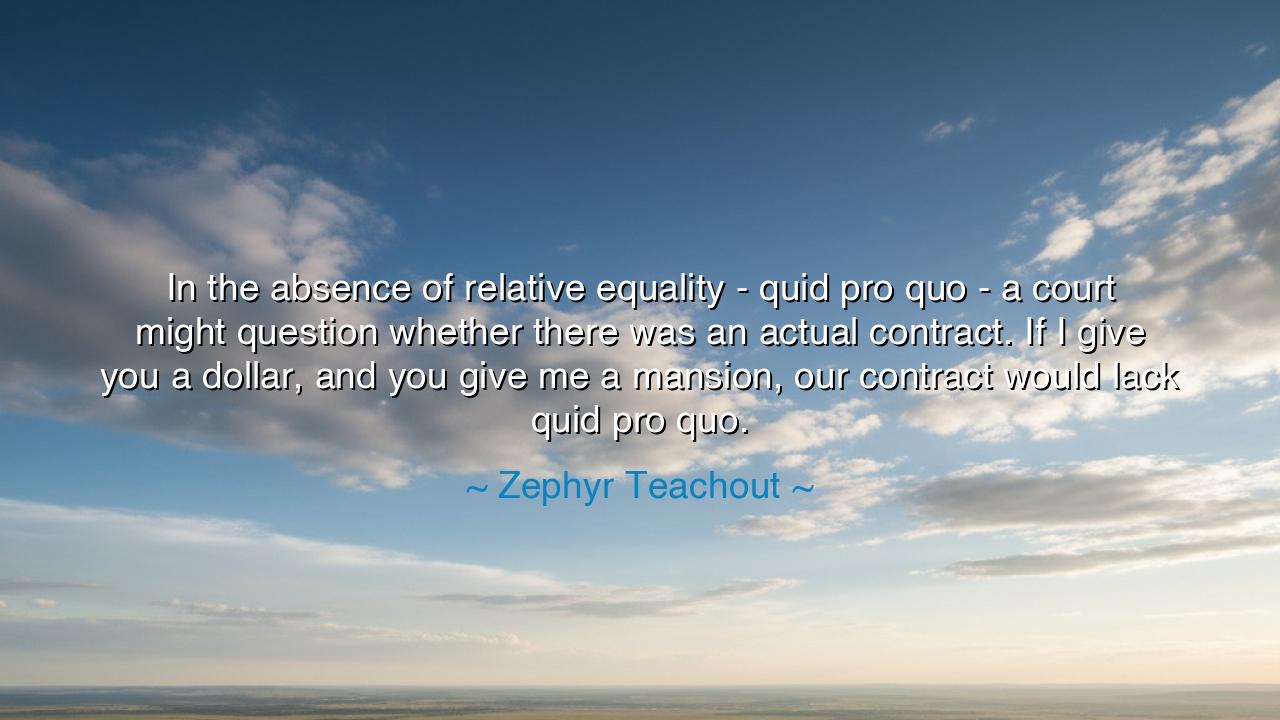
In the absence of relative equality - quid pro quo - a court
In the absence of relative equality - quid pro quo - a court might question whether there was an actual contract. If I give you a dollar, and you give me a mansion, our contract would lack quid pro quo.






Listen closely, O Children of the Future, to the words of Zephyr Teachout, who speaks of the essential principles of justice, equality, and the contractual bond: "In the absence of relative equality - quid pro quo - a court might question whether there was an actual contract. If I give you a dollar, and you give me a mansion, our contract would lack quid pro quo." Here, Teachout brings forth a fundamental truth of both human interaction and law: a contract, whether between two individuals or two great powers, must be based on a sense of fairness, balance, and reciprocity. The concept of quid pro quo, meaning "something for something," is a pillar of justice, a principle that ensures both parties to an agreement are giving and receiving something of roughly equal value.
In the ancient world, the concept of reciprocity was central to both the personal and political contracts that shaped society. The Greek philosophers recognized the need for balance and fairness in all agreements, for it was understood that without fairness, there could be no true justice. Plato, in his dialogues, explored the concept of the social contract, where the citizens of a city-state agreed to live by the laws in exchange for the protection and stability that the city-state provided. But what was this protection worth if it was not equally matched by the responsibilities of the citizens? The quid pro quo of the agreement rested in the balance of obligations: the people gave their allegiance and obedience, and in return, the state ensured their safety and freedom.
Consider the story of Coriolanus, the tragic Roman hero. In the tale, Coriolanus is a military leader who has earned great respect and wealth through his service to Rome. However, as Rome begins to falter, Coriolanus finds that the social contract between him and the state is no longer in balance. In his view, he has given all to Rome, but the city does not honor its promises to its citizens. Coriolanus turns against Rome, not out of simple rebellion, but because the quid pro quo—the balance of benefits between a soldier and his state—has been broken. The city's failure to fulfill its side of the agreement led to his tragic fall. This ancient story teaches us that when one party in a contract gives far more than it receives, the agreement collapses.
Teachout’s words echo this ancient wisdom. The idea of a contract—whether it be personal, professional, or political—rests on the principle of mutual benefit, or quid pro quo. Without this equality of exchange, the contract cannot stand. In her example, if one party gives something small—a dollar—and receives something immense—a mansion—the agreement lacks balance, and therefore, the terms of the contract would likely be invalid. Such an agreement is not just unfair; it is a perversion of justice itself, a mockery of the true purpose of exchange. Equality in contracts is essential because it ensures that neither party is exploited, and that both sides receive something of value in return.
The ancient Romans also had a term for this kind of justice: "Fas" and "nefas." The former referred to what was right and lawful, while the latter referred to what was unjust or wrong. Rome's legal system was built upon the idea that all transactions—be they legal, financial, or personal—should be balanced, with fairness at their core. For the Romans, a contract was a reflection of their moral obligations to each other and the state. When the balance was broken, it was a violation not only of the law but of personal honor. Just as Teachout’s critique suggests, a fair contract is a moral contract, one that holds both parties accountable to the laws of justice and equality.
The lesson, O Children, is one of balance, fairness, and moral responsibility. In a world where exchanges happen at every level, it is vital to recognize that justice does not arise from one-sided agreements but from those where both sides offer and receive something of value. Whether in personal relationships, professional dealings, or the governance of a nation, quid pro quo serves as a safeguard against the abuses of power and ensures that no one is unfairly burdened or exploited. A just contract is built on the foundation of mutual respect and the understanding that fairness, not exploitation, is the cornerstone of every meaningful agreement.
In your own life, let this truth guide you: Seek equality and fairness in every exchange—in your dealings with others, in your work, in your relationships. When you give, ensure that what you receive is not disproportionate, and when you receive, be mindful of the burden placed upon the giver. Justice in all things comes from balance. And when you enter into agreements, large or small, ask yourself: Is there fairness here? Is there equality in this exchange? The path to true justice is found not in self-interest but in a commitment to mutual benefit. This is the wisdom of the ancients and the truth that lives at the heart of every contract, every promise, and every agreement made between one person and another. Let your life reflect this principle, and you will walk the path of true justice.






AAdministratorAdministrator
Welcome, honored guests. Please leave a comment, we will respond soon